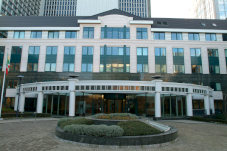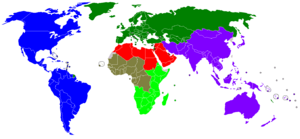World Customs Organization facts for kids
 |
|
| Abbreviation | WCO |
|---|---|
| Formation | 26 January 1953 |
| Type | Intergovernmental organization |
| Location | |
|
Membership
|
186 customs administrations |
|
Official language
|
English and French |
|
Secretary General
|
Ian Saunders (January 2024 - present) |
The World Customs Organization (WCO) is an important group that helps countries work together on customs matters. It is based in Brussels, Belgium. Customs are the rules and taxes on goods that move between countries. The WCO helps make sure trade is safe and easy for everyone.
The WCO works on many things. This includes making international rules for how goods are classified and valued. They also help secure global trade routes. They fight against fake products and illegal trading of things like weapons. The WCO also helps countries improve their customs systems. They use new technologies like artificial intelligence to make customs checks better.
Contents
How the WCO Started
The WCO started a long time ago to help countries trade more easily. In 1947, a group was formed to study how European countries could work together on customs. This led to an agreement in 1950 to create the Customs Co-operation Council (CCC).
On January 26, 1953, the CCC held its first meeting. Seventeen countries were part of it. Over time, more and more countries joined. In 1994, the organization changed its name to the World Customs Organization (WCO). Today, the WCO has 186 member countries. These members handle over 98% of all international trade.
A big step for the WCO was when it grew beyond Europe. This helped create standard customs rules around the world. Especially after many new countries became independent, the WCO helped them set up good customs systems. Now, the WCO focuses on using digital tools to make trade even smoother.
What the WCO Aims To Do
The WCO is known worldwide as the main expert on customs. It helps create and share modern customs systems and ways of working. The WCO has helped over 180 countries update their customs rules. They make sure their rules and ideas are useful for all countries.
The main goal of the WCO is to make customs administrations more effective. This helps countries reach their own goals. These goals include collecting taxes, keeping their country safe, and making trade easier. They also help protect communities and collect information about trade.
Important Tools and Agreements
To reach its goals, the WCO uses several important tools and agreements:
- The Harmonized System (HS Convention): This system helps classify goods. It was created in 1983. It uses a six-digit code for about 5,000 types of goods. This makes sure goods are classified the same way everywhere. It is used for tariffs, trade statistics, and tracking controlled goods.
- The Revised Kyoto Convention (RKC): This agreement helps make customs procedures simpler and more consistent. It was first made in 1974 and updated in 1999. It helps make customs checks clear and predictable. It also encourages using technology and working with businesses. This makes trade easier while still keeping controls in place.
- ATA Convention and the Istanbul Convention: These agreements help goods move across borders temporarily without paying duties or taxes. This is useful for things like equipment for concerts or trade shows. A special document called an ATA carnet is used for this.
- The Arusha Declaration on Customs Integrity: This declaration was made in 1993 and updated in 2003. It gives ideas on how to promote honesty and fight against corruption in customs. It helps make sure customs officials do their job fairly.
- The SAFE Framework of Standards: This framework was adopted in 2005. It helps make global trade supply chains safe and easy. It helps customs offices work together to find risky shipments. It also encourages cooperation between customs and businesses. This helps goods move smoothly and securely around the world.
- The Columbus Program: This program helps countries modernize their customs. It helps them put the WCO's standards into practice. It checks what each country needs to improve its customs operations. The WCO defines this as helping people and organizations get better at their jobs in a lasting way.
Digital Tools for Customs
The WCO has launched a new online platform called WCO Trade Tools. This platform includes important information on the Harmonized System, Rules of Origin, and Valuation. It has different versions of the HS and details from many trade agreements. This helps customs officials and businesses find the information they need quickly.
How the WCO is Run
The WCO is led by a Secretary General. This person is chosen by the member countries for a five-year term. Ian Saunders from the United States became the Secretary General on January 1, 2024.
The WCO is guided by its Council, where all members meet once a year. There are also committees that help with specific areas. These include committees for the Harmonized System, Customs Valuation, and Capacity Building.
Under recent leaders, the WCO has focused on using digital technology in customs. They are using things like artificial intelligence to make border processes faster and more efficient. This helps member countries be ready for the challenges of today's connected global economy.
WCO Member Countries
The World Customs Organization has 186 member countries from all over the world. These countries work together to make international trade smoother and safer. They share ideas and follow common rules to help goods move across borders. This includes countries from North and South America, Europe, Africa, Asia, and the Pacific Islands.
 | William M. Jackson |
 | Juan E. Gilbert |
 | Neil deGrasse Tyson |



